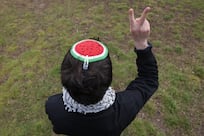We live in an ADHD world. It is usually children who are diagnosed with attention deficit hyperactivity disorder, or ADHD, but the symptoms appear to affect all of us with access to a smartphone, tablet or laptop.
The medical textbooks say ADHD is a behavioural disorder in which sufferers display “inattentiveness, hyperactivity and impulsiveness”.
We live in an ADHD world because everything is designed to grab our attention, whether it has any real value or not. In Donald Trump, we have the world's first ADHD president, the attention-seeking king of clickbait.
Whenever he is caught out in the real world of investigations and scandals – most recently the separation of children of migrants entering Texas – the president reaches for his favourite weapon, Twitter. He tells us, machine gun-style, that it has nothing to do with him; it's Barack Obama's fault or Congress which is to blame.
In fact, the president’s own Republican Party runs both Houses of Congress and the person who ordered child separation is Mr Trump himself but the king of clickbait grabs attention; then worthy people around the world take the bait and try to correct his lies and tweet their anger.
James William's new book Stand Out Of Our Light is an impressive study of how attention-grabbing nonsense is destroying our lives.
Williams quotes an estimate that Mr Trump's clickbait is worth $2 billion to Twitter, about 20 per cent of its total value.
Trump slogans – such as make America great again, drain the swamp, lock her up, build the wall – have resulted in nothing of any practical value, except to draw attention to the attention-seeking writer and get him elected to the presidency.
His summit with North Korea’s Kim Jong-un was another profound success for the attention-seeker-in-chief and his Korean equivalent. Mr Kim, after all, commanded attention by firing rockets over Japan and threatening a nuclear war.
The Singapore summit resulted in a supposed deal, which echoed similar failed “agreements” over the past 25 years – so the only definite winners were the attention-seekers themselves.
In the UK, we have our own vacuous attention-grabbers. British Foreign Secretary Boris Johnson brilliantly navigates the ADHD world while achieving little beyond drawing attention to himself.
In recent years, he has botched sensitive negotiations over a British woman held in Iran; bought unusable German anti-riot water cannons for London; found himself stuck on a zip wire while waving a British flag; suggested building a London airport on mudflats at sea; backed a ludicrously expensive garden bridge over the Thames – and various other crackpot schemes, including building a 22-mile bridge across the English Channel to France and another spanning 14 miles across the Irish Sea.
Not one of these schemes has resulted in anything practical, other than focus on the attention-grabber. The water cannons will never be used; the other schemes will never be built.
______________________
Read more from Gavin Esler:
[ Voters will judge Trump on the economy, not on his moral or constitutional values ]
[ Are mothers to blame for the spate of young women extremists? ]
[ Migrants are easy targets for the 'race card' ]
______________________
The Johnson case suggests attention-grabbers profit even from the most negative attention. Mr Trump admitted paying off porn star Stormy Daniels, offering support to neo-Nazi demonstrators, undermining the G7 and calling for a parade the US military does not want are events which most certainly seize attention but perhaps only in the way we all turn to rubberneck at a traffic accident.
The same attention-grabbing devices are used by some of the most desperate online news sources and celebrity gossip sites. But the real danger is that we are swamped with so much vacuous attention-grabbing that we cannot find the truly important information necessary to make our lives better.
As Williams puts it in his book: "What do you pay when you pay attention? You pay with all the things you could have attended to but didn't."
Raging at Mr Trump or being perplexed by the popularity of a serial failure such as the British foreign secretary drowns out more important concerns in our real lives.
So what can be done? A friend suggests what he calls “ignora-therapy” – ignoring the buzz of the clickbait kings. It might help.
Educationalists in France have banned the use of mobile phones in schools; the UK is considering following suit.
This presents some practical problems but it reminds pupils and their parents that school is for learning. Staring at Instagram, playing Tetris or reading about Beyonce will not ultimately help you succeed in life.
The good news is that more and more of us have recognised that much of what we consume online, whether it is Facebook, Instagram or Twitter, is hidden advertising.
As numerous critics have commented, if you do not know what the product is, then it is you being "sold" – your habits, your likes, your purchases and ultimately, perhaps, your votes.
We should stop speaking of this as the information age. It’s not. It’s the attention deficit age, with an ADHD American president and a matching political culture worldwide. Ritalin is sometimes prescribed to help children with attention deficit order to concentrate.
The antidote we need now is the courage to expose the clickbait kings – and to offer them not our valuable attention but our ridicule and contempt.
Gavin Esler is a journalist, author and television presenter





